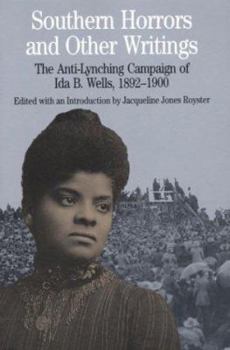Southern Horrors and Other Writings: The Anti-Lynching Campaign of Ida B. Wells, 1892-1900
Select Format
Select Condition 
Book Overview
Ida B. Wells was an African-American woman who achieved national and international fame as a journalist, public speaker, and community activist. This volume collects three pamphlets that constitute her major works during the anti-lynching movement: Southern Horrors: Lynch Law in All Its Phases , A Red Record , and Mob Rule in New Orleans .
Format:Paperback
Language:English
ISBN:0312116950
ISBN13:9780312116958
Release Date:May 1996
Publisher:Bedford Books
Length:240 Pages
Weight:0.58 lbs.
Dimensions:0.5" x 5.5" x 8.3"
Customer Reviews
4 ratings
Brief Yet Thorough Book About the Anti-Lynching Campaign of Ida B. Wells-Barnett
Published by Pageturning Priestess , 2 years ago
I am happy to have this book in my possession and that my bookshelf houses the great writings of a powerful Black woman. The author did an excellent job not only in compiling three of Mrs. Barnett's pamphlets but also educating the reader about the type of society Ida B. Wells-Barnett was born into. I learned much information from this brief yet great book.
American Lady
Published by Thriftbooks.com User , 14 years ago
This was an outstanding book, I would suggest it to everyone to read. It is so educational and sad to see how they were treated back in those days.
Powerful words
Published by Thriftbooks.com User , 19 years ago
Ida B. Wells was an African-American woman of the late nineteenth and early twentieth century. She was born and grew up in the South, born in Mississippi during the Civil War. It is significant the impact of the legacy of slavery on her life -- she recounts how her parents, who were married as slaves, remarried each other as free persons after the war. Wells was a determined and intelligent woman -- her parents died while she was young, yet old enough to be left with the responsibility of her younger brothers and sisters. At the age of 14 she found herself at the head of a household with five younger children. She worked hard to make sure that her education did not suffer, and eventually (a rarity for women of any colour in America at the time) went to work for a newspaper. In an incident that foreshadowed Rosa Parks, she was once removed from a train for sitting in the wrong section, despite her ownership of a valid ticket for the seat. She sued the railroad and won (newspaper headlines read 'Darky Damsel Gets Damages' without concern for the racist tone), but the judgment was overturned on appeal, and she later discovered her lawyers had been paid off by the railroads, and the appellate judges had thought she was just being uppity to pursue the matter. Such was the state of the African-American community that none came to her assistance as she pursued this fight. This made her more determined to organise and fight. Several of her newspaper partners and other friends in Memphis were lynched for these efforts, and Wells was threatened herself, and left the South, but did not give up her crusade. Where ever she went, through cities and towns in the North as well as over to Europe (where, she said, she felt like she was treated as a real human being equal with others for the first time) she decried the injustice of laws which dismissed charges or gave light sentences if victims were coloured, and prosecuted more strongly, gave out harsher sentences, or even resorted to lynch mobs if the defendant (who was often not guilty) was coloured. She continued speaking and publishing up to her death in 1931. She was never afraid of making herself unpopular, and often upset the African-American community by being critical of their complacency (especially the upper and middle classes). She became unpopular by standing against the military service during World War I, because of prejudicial and discriminatory practices, and never quite recovered in popular esteem from that. But Wells had courage and determination that is rare in persons, male or female, of any colour, of any time, to take on such a task as the exposition and combat of lynching in the South during the post-Civil War decades. Talking directly with governors and even a president, Wells made her voice heard, and it was a difficult hearing in a difficult time. This book, edited and introduced by Jacqueline Jones Royster, includes three primary publications of Ida B. Wells: Southern Horror
Raw But Real American History
Published by Thriftbooks.com User , 23 years ago
Mrs. Ida B. Wells-Barnett should be as well known as Soujourner Truth or Rosa Parks. This was one revolutionary heroine! She was run out of Memphis for writing boldly about lynchings in the 1890s. She also did an in-depth study on lynching called "A Red Record" (included here) that told the truth about this practice on a national level. Another excellent segemnt teels the forgotten true tale of Robert Charles, who unsucessfully stood up to a New Orleans Lynch mob in 1900 using credible primary sources (see als William Ivy Hair's "Carnival of Fury" on that subject). This is the history you didn't get from your high-school teacher! READ it!





